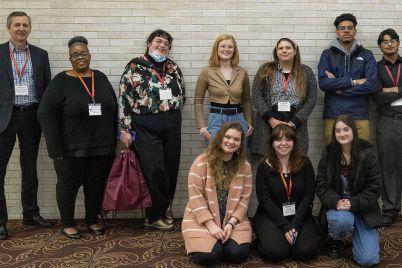
The automated blackjack-dealing machine deals cards to guests during the IT open house. Brandon Howell | Washtenaw Voice
By MYISHA KINBERG
Staff Writer
Picture a robot.
Most will recall images of human-like androids, the stuff of science fiction lore, but to students in the automation technology and mechatronics programs at Washtenaw, “robot” means something entirely different. And attendees of the April 29 Industrial Technology Department Robotics Open House learned that there’s more to these machines than meets the eye.
In their fourth semester at WCC, students in these programs take a class called Robotics IV taught by David Braun and his assistant, Ed Grabow.
The course gives the students the first 14 weeks of the semester to find a group and create a project to display at the IT open house during the last week of the semester. The project, along with very few other things, will determine the student’s final grade in the course.
Mike Scoffins, 25, of South Lyon, worked with a group to create a robot that dealt a game of blackjack.
“We have multiple systems working together right now. We programmed a camera to identify the cards and we have a Programmable Logic Controller (PLC) program for game logic. It tells the robot when the game is over, when to pick up the cards and prepare for a new game,” Scoffins said. “We also programmed the robot to do certain actions at different times. There’s a touch screen that lets players start a new game and pick if they want to ‘hit’ or ‘stay.’”
Scoffin expressed that this automated machine version of blackjack is actually very similar to a simple blackjack computer game.
WCC houses one of the leading community college robotics programs in Michigan. Many people come to school at WCC in particular for the program and the teachers because of the skills the students can gain. Logan Thorn, 20, of Pinckney, can attest to this.
“Pinckney High School has a great robotics program that’s available for students for all four years they attend. I took classes there before I graduated. A lot of graduates from Pinckney High School come here to continue in robotics,” said Thorn.
Thorn was part of one of the four groups with projects on display. Thorn’s group used two robots, one to handle materials and the other to use the material to do welding. Thorn did the wiring for his group’s project.
For almost a year now, Thorn has worked for a robotic welding company in Howell called Hatch Stamping Company. After gaining more skills and getting his associate degree in automation, Thorn may continue his education to pursue a bachelor’s to bring back to his job in the field.
Bob Nahas, 48, works for a machine shop called A.D. Heller in his hometown of Milford.

Aaron Rowe, a 41-year-old mechatronics and industrial electronics student, oversees the automated blackjack-dealing machine at the IT open house on Wednesday, April 30. Brandon Howell | Washtenaw Voice
“After getting our associate degree in mechatronics from here, my co-worker (and fellow group member) Justin Anderson and I will be part of an engineering program at Heller,” Nahas said.
Nahas and his group used a machine to create and grind down a pegboard with holes and programmed their robot to grab the board from the machine after it was done being shaped, putting pegs in the holes on the board one-by-one.
The final product resembled the peg board game seen at places like Cracker Barrel. Nahas said he and Anderson, 34, used resources from work and ordered a lot of materials online to bring the project to life. Fellow group member Matt Hole, 25, primarily worked on the electronics of the project.
The final project displayed a robot that engraves 64 squares on a blank piece of material to create a checkerboard. The robot also engraves assorted black and white checkers and then puts all the finished pieces in a box. One of the students working on this project was 29-year-old Louis Dumas.
“I programmed the robot to teach it location and how to place the chips in the right spot and how to grind and engrave them. I helped program PLC to allow the computer to actually operate the machine,” Dumas said.
Instructor and WCC alumnus David Braun has worked in the IT department for almost 30 years.
“Our program here at WCC is great for gaining skills because we have a very diverse group of robots, and we teach by giving more of an overview rather than details about every robot,” Braun said. “We would rather have students understand the system because it gives you more opportunities and lets students take away a broad understanding that can be applied to many different jobs.”
Although the market is tough, students can find success if they work hard, Braun said, and the open house is a way to connect them with career paths.
“We want everyone to understand that you can really make money in this field. So many people shy away from robotics without realizing how many opportunities there are in this field,” Braun said. “The industry is very demanding. At this event alone, I have probably around 10 different employers ready to hire.”

